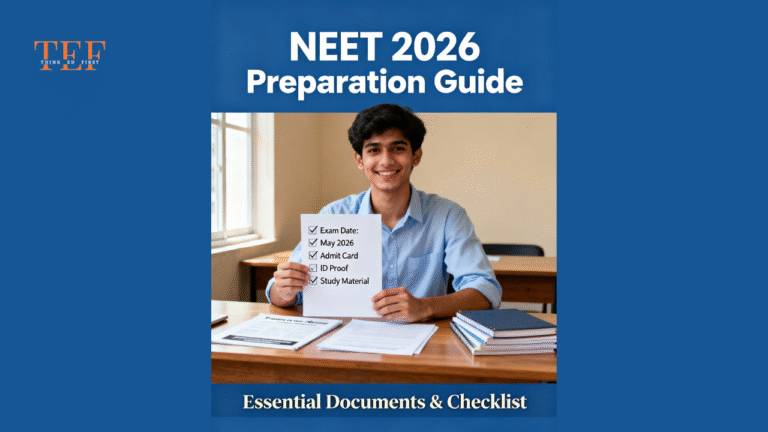Here is an updated checklist with subject-wise important chapters to help you score more than 650 in NEET:
Preparation Planning
- Understand the Exam Pattern and Syllabus:Know the detailed syllabus and exam pattern. The NEET exam consists of Physics, Chemistry, and Biology sections.
- Create a Practical Study Routine:Make a well-structured timetable considering your school timings, coaching classes, self-study, and relaxation time. Update the schedule regularly based on your progress.
Subject-wise Important Chapters and Preparation
- Physics:
- Class 11:
- Units and Measurement:Understand the concepts of units, measurements, errors, and dimensions.
- Kinematics:Master motion in 1D and 2D.
- Laws of Motion:Focus on Newton’s laws and friction.
- Work, Energy, and Power:Learn the work-energy theorem.
- Rotational Motion:Study torque and angular momentum.
- Gravitation:Cover Kepler’s laws and satellites.
- Properties of Solids and Liquids:Understand stress, viscosity, and surface tension.
- Thermodynamics:Learn about heat, the first and second laws.
- Kinetic Theory of Gases:Study gas laws and degrees of freedom.
- Oscillations and Waves:Focus on SHM and wave motion.
- Class 12:
- Electrostatics:Learn Coulomb’s law and Gauss theorem.
- Current Electricity:Understand Ohm’s law and Kirchhoff’s rules.
- Magnetic Effects and Magnetism:Study Ampere’s law and solenoids.
- Electromagnetic Induction and AC:Focus on Faraday’s law and LCR circuits.
- Electromagnetic Waves:Learn about the EM spectrum and applications.
- Optics:Cover reflection, refraction, and wave optics.
- Dual Nature of Matter and Radiation:Study the photoelectric effect.
- Atoms and Nuclei:Learn about the Bohr model and nuclear energy.
- Electronic Devices:Focus on semiconductors and logic gates.
- Experimental Skills:Understand instruments and experiments.
- Preparation Tips:Use reference books such as Problems in General Physics by I.E. Irodov, Fundamentals of Physics by Halliday, Resnick & Walker, and Concepts of Physics Vol I and II by H.C. Verma. Practice numerical problems daily and understand the concepts well. Prepare bullet points on sticky paper and stick them on the wall to help memorize and understand facts.
- Class 11:
- Chemistry:
- Physical Chemistry:
- Some Basic Concepts of Chemistry:Understand the mole concept and stoichiometry.
- Atomic Structure:Learn about the Bohr model and quantum numbers.
- Chemical Bonding:Focus on VSEPR, hybridization, and MOT.
- Thermodynamics:Study the first law, enthalpy, and entropy.
- Equilibrium:Understand chemical and ionic equilibria.
- Solutions:Learn Raoult’s law and colligative properties.
- Electrochemistry:Focus on the Nernst equation and conductance.
- Chemical Kinetics:Study rate laws and the Arrhenius equation.
- Inorganic Chemistry:
- Classification of Elements:Understand periodic trends and properties.
- P-Block Elements:Study groups 13-18.
- d- and f-Block Elements:Learn about transition metals and lanthanoids.
- Coordination Compounds:Focus on Werner’s theory and CFT.
- Organic Chemistry:
- Some Basic Principles and Techniques:Understand the basics of organic chemistry.
- Hydrocarbons:Study the properties and reactions of hydrocarbons.
- Alcohols, Phenols, and Ethers:Focus on the structure and reactions of these compounds.
- Chemical Bonding and Molecular Structure:Learn about different types of bonds and their significance.
- Preparation Tips:Refer to books like Organic Chemistry by Morrison and Boyd, Concise Inorganic Chemistry by J.D. Lee, Organic Chemistry by Peter Sykes, and Physical Chemistry for Medical Entrance by OP Tandon. Understand the basic theories and solve numerical problems. Learn and revise name reactions and formulas every day.
- Physical Chemistry:
- Biology:
- Botany:
- Cell: The Unit of Life:Understand cell structure and function.
- Biomolecules:Learn about the structure and function of biomolecules.
- Cell Cycle and Cell Division:Focus on the processes of cell cycle and division.
- Molecular Basis of Inheritance:Study the molecular basis of genetic inheritance.
- Principles of Inheritance and Variation:Understand the principles of inheritance and genetic variation.
- Sexual Reproduction in Flowering Plants:Learn about the reproductive processes in plants.
- Genetics and Evolution:Focus on genetics and evolutionary biology.
- Ecology and Environment:Study ecology, environmental cycles, biodiversity, and conservation.
- Biodiversity and Conservation:Understand the concept of biodiversity and its conservation.
- Anatomy of Flowering Plants:Learn about the anatomy of flowering plants.
- Zoology:
- Structural Organisation in Animals:Understand the structural organization of animals.
- Locomotion and Movement:Study the mechanisms of locomotion and movement.
- Body Fluids and Circulation:Learn about body fluids and their circulation.
- Human Reproduction:Focus on the human reproductive system.
- Reproductive Health:Understand reproductive health and related issues.
- Breathing and Exchange of Gases:Study the process of breathing and gas exchange.
- Excretory Products and their Elimination:Learn about excretory products and their elimination.
- Biotechnology: Principles and Processes:Understand the principles and processes of biotechnology.
- Biotechnology and its Applications:Study the applications of biotechnology.
- Human Health and Disease:Learn about human health and various diseases.
- Preparation Tips:Use the “Get, Gaze, Memorize” method for flow-charts, diagrams, and mind maps. Practice more than 100 MCQs for a thorough understanding of Microbiology and Genetics. Utilize books like Objective NCERT at Your Fingertips for NEET, Trueman’s Elementary Biology Volume – I and Volume – II, AC Dutta for Botany, and 11th and 12th NCERT textbooks.
- Botany:
Practice and Revision
- Practice NEET Previous Years’ Question Papers and Mock Tests:Regularly solve previous years’ question papers and take mock tests to get familiar with the type of questions asked and the exam pattern. This will also help you identify your weak areas and improve your time management skills.
- Revise Religiously:Revision is crucial for retaining information. Make it a daily habit to revise the topics you have studied. You can use flashcards, summary notes, or any other method that suits you best.
Miscellaneous
- Identify and Work on Areas of Improvement:Go through the complete syllabus and identify topics that require more understanding and learning. Prioritize these areas and work on them first.
- Join a Good Test Series:If possible, join a reliable test series. It will provide you with a comprehensive assessment of your preparation and help you track your progress.
- Get Proper Rest and Sleep:Ensure you get enough sleep and rest, especially during the last days of preparation. Lack of sleep can lead to fatigue and affect your performance in the exam.





